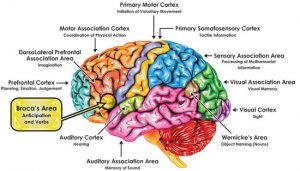What is a soul?
In answering that question, you might say that the soul is something immortal, separate from your physical body. Maybe you feel that your soul will continue existing after your corporeal death, either here on earth, or in another life, or in another place (i.e. Heaven, Nirvana, etc).
In addition to surviving beyond our physical time on earth, the soul is often perceived as being part of our agency or moral code. That is, our morals, personality, and ability to decide things for ourselves all come from our soul, which is independent from our physical body. This means that when your earthly body ends, your soul will still retain everything that make you you.
It’s definitely a very comforting thought, but how well does this add up with scientific studies?
Neuroscience
Since 1962, when the term neuroscience was first coined(1), huge leaps have been made in our understanding of the human brain. With imaging technologies such as fcOIS, MRI, and DOT, to name a few, scientists are provided a window through which to observe the functions of the brain.
Brain mapping, or parcellation, has become particularly popular in its attempts to section out the brain into functionally distinct regions. The below graphic depicts a rudimentary example of function mapped out on a cerebral cortex.

http://dankoboldt.com/brain-surgery-neuroscience/
You can see vision is processed in the back of the brain in the occipital lobe, hearing is on the temporal lobe (in the middle), and tactile information is processed on the top of the brain, in the parietal lobe. But all of those things are for the physical body, right? That doesn’t say anything about the soul.
Interestingly, imagination, emotion, memory, conscious thought, and moral judgments are also mapped out on the brain (2, 3, 4). Those hit a little closer to home with our perception of the soul.
Alzheimer’s forms plaques over the hippocampus, which is involved in memory – hence why Alzheimer’s patients have trouble processing and recalling memories. Damage to the frontal lobes of the brain can lead to poor impulse control, personality changes, risky behavior, and trouble regulating emotions (4). Empathy, too, seems to result from the physiology of our brains: individuals with antisocial personality disorder (6), autism spectrum disorder (5), or other empathy-related disorders have subtle differences in the structure of their brains from individuals who do not have these disorders.
This implies that our memory, our personality and moral judgments, and our ability to empathize or interact with other human beings, may simply be a result of the structure of our brain – not our soul.
What does this say about the soul?
Nothing definite!
The brain definitely seems to control all our attributes, both physical and mental – it lets us see the world around us, feel different textures, consciously think about ourselves, and make moral judgments. Changing the brain’s physiology can change our personality, such as with frontal lobe damage. Strokes damaging your brain can affect your ability to think clearly, and Alzheimer’s alters your ability to process and recall memories.
Even so, it’s difficult to entirely disprove the soul mostly since, it being non-corporeal, it’s pretty hard to study!
But it may also be true that who we are as individuals simply comes from the strange and amazing mix of white and grey matter that makes up our brain.
 http://www.express.co.uk/life-style/top10facts/564836/Top-10-facts-about-the-brain
http://www.express.co.uk/life-style/top10facts/564836/Top-10-facts-about-the-brain
References
- “Half a century of neuroscience.” Mind Hacks, https://mindhacks.com/2015/02/14/half-a-century-of-neuroscience.
- Addis, Donna. “Constructive episodic simulation of the future and the past: Distinct subsystems of a core brain network mediate imagining and remembering.” Neuropsychologia, vol. 47, issue 11, 2009, pp. 2222-2238, http://www.sciencedirect.com/science/article/pii/S0028393208004223. Accessed 17 Sept. 2016.
- Greene, Joshua. “An fMRI Investigation of Emotional Engagement in Moral Judgment.” Science, vol. 293, issue 5537, 2001, pp. 2105-2108, http://science.sciencemag.org/content/293/5537/2105.full. Accessed 17 Sept. 2016.
- “Frontal Lobe Brain Injury.” Brainandspinalcord.org, http://www.brainandspinalcord.org/frontal-lobe-brain-injury.
- Wegiel, Jerzy. “The neuropathology of autism: defects of neurogenesis and neuronal migration, and dysplastic changes.” Acta Neuropathologica, vol 119, issue 6, pp. 755-770, 2010, http://link.springer.com/article/10.1007/s00401-010-0655-4. Accessed 17 Sept. 2016.
- Anderson, Nathaniel. “The psychopath magnetized: insights from brain imaging.” Trends in Cognitive Sciences, vol 16, issue 1, 2012, pp. 52-60, http://www.sciencedirect.com/science/article/pii/S1364661311002415. Accessed 17 Sept. 2016.
As someone who has not given much thought to whether or not the “soul” is an essence or physical entity, I found this article informative and thought provoking. I have however taken great interest in neurology, so the topic immediately captured my interest. The way the soul and brain function were correlated was interesting food for thought. I enjoyed the explanation of brain activity and the way the soul is supposedly expressed via this activity. Definitely going to look into this!
Thanks! I’ve found that a lot of people don’t think about the soul too much, but the idea of a soul is pretty prevalent in a lot of religions and personal beliefs. I love how neurology is starting to explore these ‘mind-based’ concepts more.
I thought that this was in an interesting topic, the idea of a soul and something that cannot really be mapped out or studied has many people questioning what makes up the soul and is it real. Because scientist cannot physically examine what makes each person unique has far as how each individual person thinks differently and so on they question if it is really real. I thought you touched on some interesting thing as far as what parts of the brain could make up the soul and so on.
Thank you! It’s pretty wild how neuroscience is making it possible to examine and study things that previously seemed impossible to study.
Yes it is wild! You pose some interesting facts for us to think about. And I liked the visuals you included.